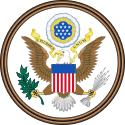it is time we fight for our rights
we can not let obama and his muslims take our freedom of religion
if the gays and muslims want to take our rights to love jesus then they should lose they rights too
First Amendment to the United States Constitution
From Wikipedia, the free encyclopedia
"First Amendment" redirects here. For other uses, see First Amendment (disambiguation).
| United States of America |
|---|

This article is part of the series:
|
| Original text of the Constitution |
The Bill of Rights was originally proposed as a measure to assuage Anti-Federalist opposition to Constitutional ratification. Initially, the First Amendment applied only to laws enacted by the Congress, and many of its provisions were interpreted more narrowly than they are today. Beginning with Gitlow v. New York (1925), the Supreme Court applied the First Amendment to states—a process known as incorporation—through the Due Process Clause of the Fourteenth Amendment.
In Everson v. Board of Education (1947), the Court drew on Founding Father Thomas Jefferson's correspondence to call for "a wall of separation between church and State", though the precise boundary of this separation remains in dispute. Speech rights were expanded significantly in a series of 20th and 21st-century court decisions which protected various forms of political speech, anonymous speech, campaign financing, pornography, and school speech; these rulings also defined a series of exceptions to First Amendment protections. The Supreme Court overturned English common law precedent to increase the burden of proof for defamation and libel suits, most notably in New York Times Co. v. Sullivan (1964). Commercial speech, however, is less protected by the First Amendment than political speech, and is therefore subject to greater regulation.
The Free Press Clause protects publication of information and opinions, and applies to a wide variety of media. In Near v. Minnesota (1931) and New York Times v. United States (1971), the Supreme Court ruled that the First Amendment protected against prior restraint—pre-publication censorship—in almost all cases. The Petition Clause protects the right to petition all branches and agencies of government for action. In addition to the right of assembly guaranteed by this clause, the Court has also ruled that the Amendment implicitly protects freedom of association.
No comments:
Post a Comment